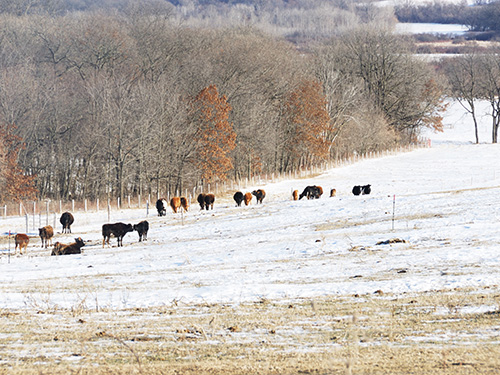The Benefits of Winter Pasture Care and Rotational Grazing
Jan 20, 2025

As winter continues, livestock producers face the challenge of maintaining healthy animals while preserving their pastures for long-term use. Without proper care, pastures can suffer from overgrazing, soil compaction, and nutrient depletion, leading to poor regrowth in the spring and increased feed costs. However, implementing effective strategies during the colder months can safeguard both pasture health and livestock nutrition, setting the stage for a successful season.
To help producers manage their pastures more effectively this winter, here are several valuable tips on winter pasture care and rotational grazing techniques to promote healthier livestock, improve pasture longevity, and boost overall farm efficiency.
The Role of Rotational Grazing
Rotational grazing involves moving livestock between multiple pasture sections, allowing each area time to recover and regenerate. This practice offers numerous benefits, particularly in the winter months:
Key Winter Pasture Care Practices
To maximize the benefits of rotational grazing and winter pasture care, consider the following tips:
Long-Term Benefits
By adopting rotational grazing and winter pasture care strategies, producers can experience:
Proper winter pasture care and rotational grazing are essential components of a sustainable livestock operation. By taking proactive steps now, producers can safeguard their pastures, boost livestock health, and ensure long-term farm success. For more resources and expert advice on pasture management, visit your local Co-op today!
Find the nearest Co-op location here. For more seasonal farm tips, check out the latest issue of The Cooperator.
To help producers manage their pastures more effectively this winter, here are several valuable tips on winter pasture care and rotational grazing techniques to promote healthier livestock, improve pasture longevity, and boost overall farm efficiency.
The Role of Rotational Grazing
Rotational grazing involves moving livestock between multiple pasture sections, allowing each area time to recover and regenerate. This practice offers numerous benefits, particularly in the winter months:
- Improved Forage Utilization: Livestock consume available forage more evenly, reducing waste.
- Enhanced Soil Fertility: Manure distribution across multiple pastures enriches the soil, and rested pastures retain more organic matter and nutrients.
- Reduced Mud and Compaction: By limiting animal traffic, the ground stays healthier and more productive.
- Healthier Livestock: Consistent access to quality forage supports immune function and body condition during winter stress periods.
Key Winter Pasture Care Practices
To maximize the benefits of rotational grazing and winter pasture care, consider the following tips:
- Stockpile Forage: Allow certain pastures to grow in late summer and early fall for winter grazing.
- Use Bale Grazing: Strategically place hay bales in fields to encourage even grazing and manure distribution.
- Implement Frost Seeding: Over-seed legumes and grasses in late winter for enhanced spring growth.
- Monitor Stocking Rates: Avoid overloading pastures with too many animals to prevent overgrazing.
- Provide Supplemental Feed: In extreme weather, ensure livestock have access to high-quality hay or grain.
Long-Term Benefits
By adopting rotational grazing and winter pasture care strategies, producers can experience:
- Lower Feed Costs: Efficient use of pasture reduces dependence on stored feed.
- Improved Pasture Productivity: Healthier soils and plants result in better regrowth and resilience.
- Increased Livestock Performance: Consistent nutrition and reduced stress improve weight gain and reproduction rates.
Proper winter pasture care and rotational grazing are essential components of a sustainable livestock operation. By taking proactive steps now, producers can safeguard their pastures, boost livestock health, and ensure long-term farm success. For more resources and expert advice on pasture management, visit your local Co-op today!
Find the nearest Co-op location here. For more seasonal farm tips, check out the latest issue of The Cooperator.